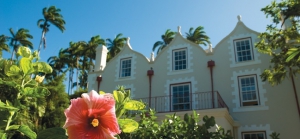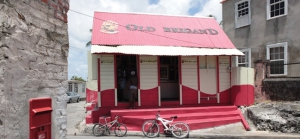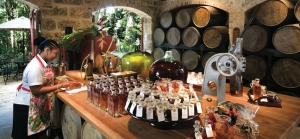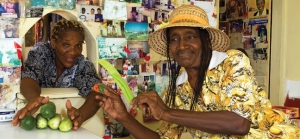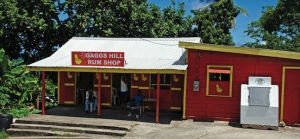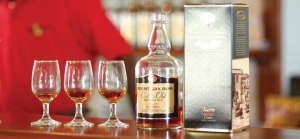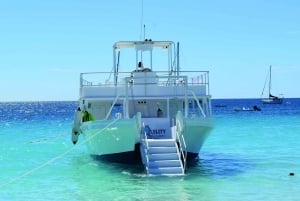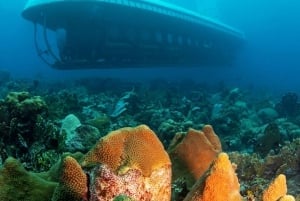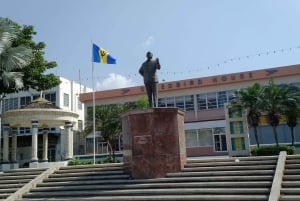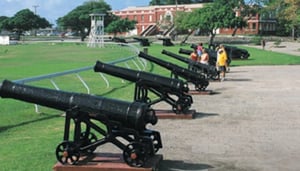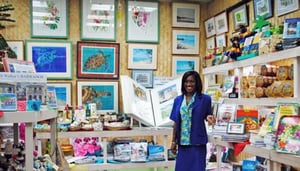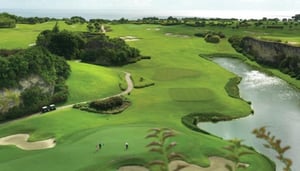Barbados Rum & Rum Shops
Barbadian Gold
In terms of quality, Barbados rum is undoubtedly one of the most prestigious rums produced anywhere in the world. Hold a glass of our dark rum up to the light and you will see the gold of the sun. In fact, it is believed by some that Barbados is the home of rum! Masterful blending of exquisitely distilled liquor has put it in a class of its own.
Each year Barbados rum is available in more and more countries throughout the world: from as far as Australia, Europe, USA and Canada. As a visitor to Barbados though, you have the added advantage of savouring our "liquid gold" in the very environment that it is produced - a land of sunshine and rolling fields of sugar-cane.
Rum is a spirit, but what makes it unique is that it is the only spirit that is made from the juice of the sugar cane plant. It is actually made from molasses, a thick treacly liquid left behind after the sugar has been extracted from the cane juice.
Rum making in Barbados has a long and distinguished tradition. Though it could never be claimed that rum distilling was invented in Barbados, it was certainly here that the use of the word "rum" was first recorded and from here that rum was first exported. The island was first settled in 1627 and rum production was already firmly established as early as the 1640s.
The first rum was made in pot stills adjacent to the wind driven sugar mill on each plantation. In these simple pots stills a "wash" of fermented sugar-cane molasses was heated to produce the alcohol.
The name "rum" was probably first coined in the taverns of the Bridgetown waterfront, where life was always "rumbunctious". Rum quickly became very popular with visiting seafarers and soon great amounts were sold to the ships. It was in this manner that rum first made its appearance in English ports and elsewhere. By the late 1600s "Rum Punch Houses" were opening in England, and a short while later rum became the fashionable drink in London society.
Rum has always been popular with sailers and it was the English Royal Navy that introduced their "rum ration". Interestingly enough, the word "grog" which was invented in 1731 to mean rum is still used today and expressions such as "to sink a few grogs" are widely used throughout Barbados. The word "grog" was invented when in 1731 one Admiral Vernon of the Royal Navy ordered a rum ration to be diluted because it was causing drunkenness and discipline problems. The disappointed sailors gave this new mixture the same title as the nickname for Vernon, "old grog", because of the grogam cloak he wore. Hence rum became known as grog.
Nowadays the rum is much more refined but people still talk of "firing a grog or two". Hopefully while you are here in Barbados you will have the opportunity to enjoy a few grogs.
Instead of the crude fermentation and distillation process of over 350 years ago, today's rum refinery is extremely sophisticated and efficient. However, the tradition and secret skills of Barbados' hundreds of centuries of experience continue to be utilized to give Barbados rum its unique quality and character.
At the Mount Gay Visitors Centre, which is located only five minutes away from both the Port and downtown Bridgetown, visitors can enjoy a truly Barbadian experience as friendly and knowledgeable guides take you on a tour of the distillery of the world's oldest and finest rum.
At St. Nicholas Abbey, a 19th century steam driven mill, located in the old boiling house, has been refurbished to grind sugar cane and the Warrens have established a small cottage industry in sugar-related gourmet products, including St. Nicholas Abbey Aged Rum, sugar and blackstrap molasses, all packaged, blended and bottled onsite in what was once the stables.
Also see Rum Punch in our A-Z for a delicious recipe and our to find out where you can purchase our extraordinary high-quality Barbadian rum.
Some brands of Barbados Rum are: Malibu Rum, Doorly's, Mount Gay Rum, Cockspur Rum, St. Nicholas Abbey 10 yr old rum, and E S A Field.
Rum Shops
In the days of slavery and immediate Post-Emancipation, the most entrepreneural people established small shops which sold rum, other spirits and a variety of goods. These rum shops studded the countryside and town functioning then as they do now, serving the people with everyday needs and also a social crossroads for the people of the surrounding area. Today, in Barbados, it is estimated that there are almost 1000 of these rum shops scattered around the island - be sure to visit one during your travels - if only for the experience!
The village rum shops usually have a steady flow of patrons but are particularly busy Friday evenings and weekends. After receiving their weekly wages, many of the menfolk gather at their favourite rum shop "to fire a few" (have a few drinks), "enjoy some good ol' talk" and take part in a serious (and usually boisterous) game of dominoes.
Though there are those who go to rum shops specifically to drink, there are others who are more thirsty for human interaction than alcohol. Perhaps the most passionate discussions and disputes take place over a Tiger Malt (a healthy, non-alcoholic energy drink) and a "bread and two" (a bun and two fish cakes). The subjects discussed constantly, yet never exhausted, are sports and politics. Though often loud and vehement, debates tend to deviate quickly and unpredictably, between angry outbursts and laughter usually ending in calls for "annudduh one dey!" (another drink).
Some rum shops also serve food or sell snacks, ice and sundry items. While driving around some of these are great to nip into for a quick bite or to top up your picnic basket.
Rum is generally "nipped" neat, or "licked back", chased with a soft drink and "soaked up" by a coconut bread or a lead pipe (sweet bread, the name of which explains itself). White rum tends to be favoured in the rum shop over dark rum, so you'll be wise to state your preference!
While perhaps being a less sophisticated version of an English Pub, a Bajan rum shop is probably a West Indian substitute for "Speaker's Corner" and an unequalled example of a strong community spirit and the close involvement of a people who live so well together.


